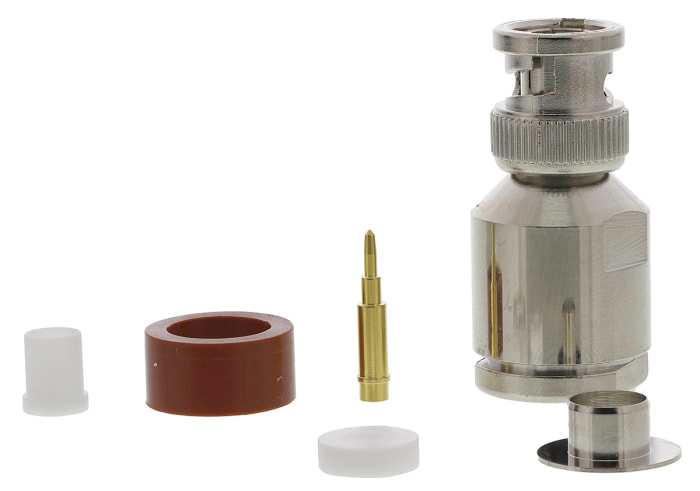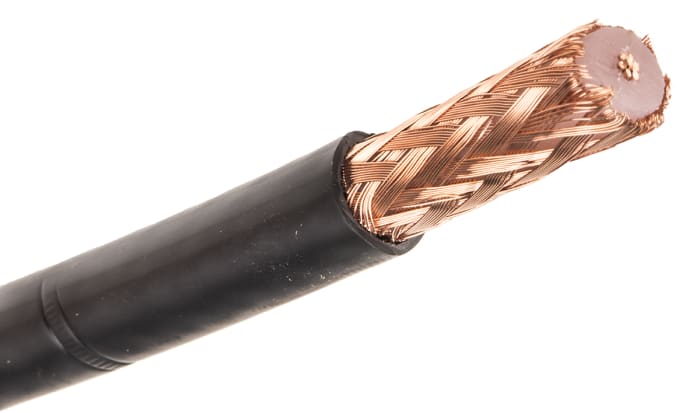RS PRO, 50m, RG213/U Coaxial, Unterminated50 Ω

Technical Document
Specifications
Brand
RS ProTerminated/Unterminated
Unterminated
Coaxial Type
RG213/U
Outer Diameter
10.3mm
Characteristic Impedance
50 Ω
Attenuation
14.5 dB/100m @ 400MHz, 55 dB/100m @ 3GHz, 9.5 dB/100m @ 200MHz
Length
50m
Sheath Colour
Black
Conductor Strand Type
Stranded
Core Strands
7/0.75
Capacitance
101pF/m
Conductor Material
Bare Copper
Size of Strands
0.75 mm
Maximum Operating Temperature
+85°C
Operating Temperature Range
-40 → +85 °C
Number of Strands
7
Sheath Material
Polyvinyl Chloride PVC
Shielding
Copper Braid
Insulation material
PE
Velocity ratio
65.9%
Minimum Operating Temperature
-40°C
Country of Origin
Germany
Product details
RG213/U High Frequency Coaxial Cable
The RG213/U Coaxial Cables are commonly used for Internal wiring of mainframes, communication instruments, and electronic devices as well as connection of test head and interface of IC test system.
What is a Coaxial Cable?
A coaxial cable is a specific type of cable that is made up from copper combined with other metal shield materials and components to block signal interference. They include one physical channel to carry the surrounding signal, usually accompanied with a layer of insulation.
Features and Benefits
• A coaxial communication cable, great for communicating!
• Pure copper wire (7 x 0.75 mm) with polyethylene insulation
• Shielding is braiding made of pure copper
• Outer sheath is made from black PVC
Typical Applications
• Transmitting signals for televisions and areal connections
• Transmitting signals of CCTV images
• Transmitting signals for broadband
• Connect satellite antenna facilities to homes and businesses
• Interconnecting telecoms industry equipment and data
• Facilitating the transmission of radio frequency signals
How do Coaxial Cables work?
Coaxial cables work through having concentric layers of electrical conductors and insulating material. The way that they are constructed is what ensures that a signal is enclosed within the cable and prevents any electrical noise from interfering with the signal.
Approvals
IEC 96 no. 50-3-1 and BS 2316
€ 434.04
€ 434.04 1 Reel of 50 Metres (Exc. VAT)
1
€ 434.04
€ 434.04 1 Reel of 50 Metres (Exc. VAT)
Stock information temporarily unavailable.
1
Stock information temporarily unavailable.
Technical Document
Specifications
Brand
RS ProTerminated/Unterminated
Unterminated
Coaxial Type
RG213/U
Outer Diameter
10.3mm
Characteristic Impedance
50 Ω
Attenuation
14.5 dB/100m @ 400MHz, 55 dB/100m @ 3GHz, 9.5 dB/100m @ 200MHz
Length
50m
Sheath Colour
Black
Conductor Strand Type
Stranded
Core Strands
7/0.75
Capacitance
101pF/m
Conductor Material
Bare Copper
Size of Strands
0.75 mm
Maximum Operating Temperature
+85°C
Operating Temperature Range
-40 → +85 °C
Number of Strands
7
Sheath Material
Polyvinyl Chloride PVC
Shielding
Copper Braid
Insulation material
PE
Velocity ratio
65.9%
Minimum Operating Temperature
-40°C
Country of Origin
Germany
Product details
RG213/U High Frequency Coaxial Cable
The RG213/U Coaxial Cables are commonly used for Internal wiring of mainframes, communication instruments, and electronic devices as well as connection of test head and interface of IC test system.
What is a Coaxial Cable?
A coaxial cable is a specific type of cable that is made up from copper combined with other metal shield materials and components to block signal interference. They include one physical channel to carry the surrounding signal, usually accompanied with a layer of insulation.
Features and Benefits
• A coaxial communication cable, great for communicating!
• Pure copper wire (7 x 0.75 mm) with polyethylene insulation
• Shielding is braiding made of pure copper
• Outer sheath is made from black PVC
Typical Applications
• Transmitting signals for televisions and areal connections
• Transmitting signals of CCTV images
• Transmitting signals for broadband
• Connect satellite antenna facilities to homes and businesses
• Interconnecting telecoms industry equipment and data
• Facilitating the transmission of radio frequency signals
How do Coaxial Cables work?
Coaxial cables work through having concentric layers of electrical conductors and insulating material. The way that they are constructed is what ensures that a signal is enclosed within the cable and prevents any electrical noise from interfering with the signal.
Approvals
IEC 96 no. 50-3-1 and BS 2316


